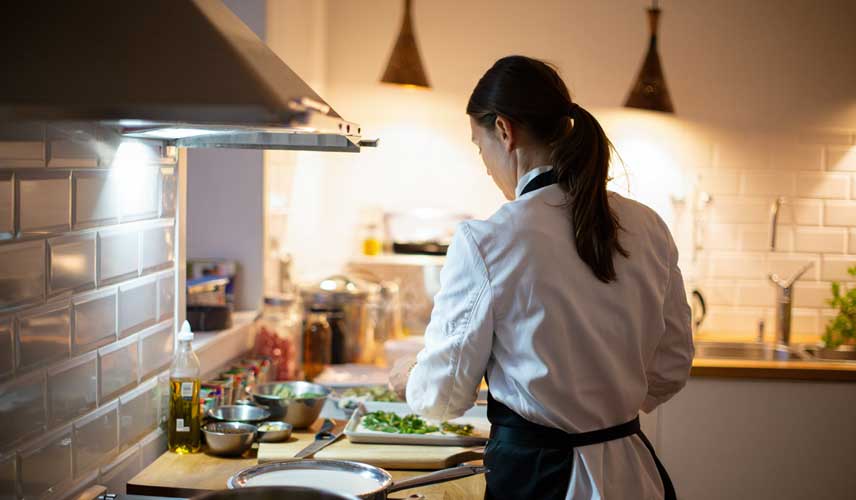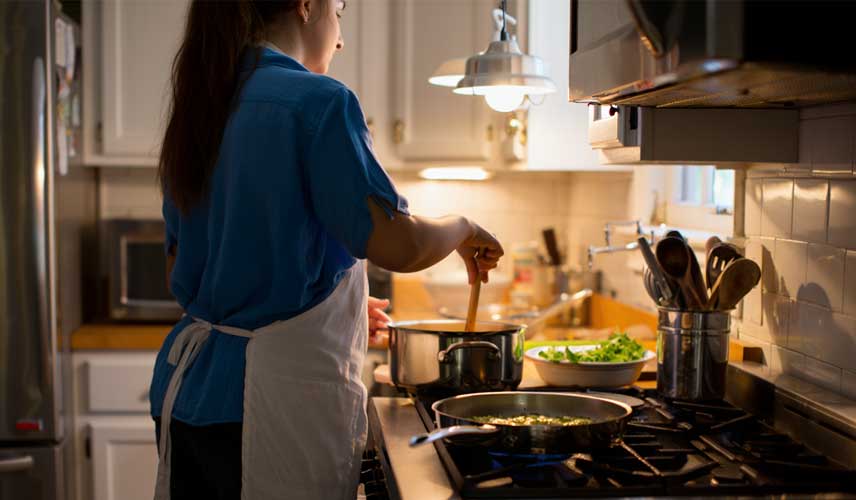
Guide and Steps to Finding a Home Chef

Today's rapidly changing living conditions eliminate the luxury of spending hours in the kitchen for many of us. A busy work schedule, the hustle and bustle of social life, or simply a lack of confidence in cooking skills turns the desire to eat healthy and delicious meals at home into a mere dream. At this point, the private chef service comes into play, bringing culinary enjoyment and gourmet flavors directly to your home.
A private chef is more than just someone who cooks; they are a professional who prepares menus tailored to your and your family's taste preferences, offers solutions based on your nutritional needs, and most importantly, saves you valuable time. So, how will you find the right chef who will provide this luxury and practical service, adapting to your family's kitchen and lifestyle? In this comprehensive guide, we will examine all the steps of the process of finding a private chef and what you need to pay attention to in detail.
Why Do You Need a Private Chef?
The private chef service is not just a luxury privilege as it is often thought, but also an investment that offers many practical benefits:
Personalized Menus: You will be introduced to menus that are tailored specifically to you, which you cannot find in restaurants, suitable for your dietary preferences (vegan, vegetarian, gluten-free, etc.), allergies, and taste. Special solutions are also offered for children or family members with special dietary needs.
Time Savings: You will be completely relieved of the hassle of grocery shopping, meal planning, cooking, preparation, and most importantly, washing dishes. This way, you can dedicate your valuable time to yourself, your family, or your hobbies.
Healthy Eating: You will escape the uncertainties of eating out and nourish yourself with healthy meals prepared at home with fresh, natural, and controllable ingredients.
Comfort and Privacy: You will have the privilege of eating whenever and however you want in the comfort of your own home. Every special moment, from hosting guests to romantic dinners, is experienced in the comfort of your home.
Discovering New Flavors: With a chef specialized in different cuisines, you will have the opportunity to explore world cuisines or regional flavors in their most authentic form.
Stress Reduction: The stress of meal preparation and planning disappears, and your worries about the kitchen decrease.
1. First Step: Clarify Your Needs and Expectations
The first and most important step in finding the perfect private chef is to clearly define your needs and expectations. This will make your search more focused and help you find the right candidate.
Frequency of Service: Do you want the chef to be full-time (every day of the week, all meals), part-time (a few days a week, just dinner), or only for special occasions and events?
Number and Type of Meals: How many meals do you expect to be prepared during the day? (Breakfast, lunch, dinner, snacks, etc.) Do your expectations differ especially on weekdays and weekends?
Kitchen Preferences: What cuisines do you enjoy? (Turkish, Italian, Mediterranean, Far Eastern, French, etc.) Is it important for the chef to specialize in certain cuisines?
Dietary Restrictions and Allergies: Do you have special dietary requirements such as vegan, vegetarian, gluten-free, lactose-free, or known allergies? Are special menus needed for children or the elderly?
Additional Tasks: Do you expect the chef to only cook, or do you want them to take on additional tasks such as grocery shopping, kitchen cleaning, dishwashing, serving, or kitchen organization? These additional tasks will directly affect the chef's job description and cost.
Guest Hosting: Do you frequently host guests at your home and expect support for special menus or large events?
Budget: Determining how much budget you can allocate for this service will help narrow down your options. The cost of a chef can vary based on their experience, job description, frequency of service, and the city they are located in.
The answers to these questions will help you clearly outline the profile of the chef you are looking for and provide a basis for the questions you will ask candidates during the interview process.
2. Research from Reliable Sources: Where to Start?
It is very important to turn to reliable and verified sources to find the right private chef.
Expert Recruitment Agencies and Consulting Firms: Agencies specializing in home services and private chef provision usually have a wide portfolio of chefs. These agencies meticulously check candidates' resumes, references, criminal records, and health checks. Thus, they present you with reliable and professional candidates. They also provide support regarding legal processes (work permits, insurance, etc.).
Advantages: Reliability, professional support, a wide range of options, legal guarantees, contract tracking.
Disadvantages: The cost may be slightly higher due to agency commissions.
Recommendations and References: Recommendations from acquaintances, friends, or reliable sources who have previously hired a private chef are very valuable. References based on personal experiences provide realistic information about the chef and give insights into potential issues.
Professional Networks and Culinary Schools: Professional platforms like LinkedIn or career centers of culinary schools can be sources to reach talented chefs. Graduates or successful students may be suitable, especially for those looking for new graduate talents.
Online Job Posting Sites: You can also post ads through some general job posting sites or home service platforms. However, in this method, you need to research candidates' backgrounds and references in much more detail and meticulously. This method requires more personal effort compared to agencies.
3. Candidate Evaluation Process: Experience, Qualifications, and Portfolio
After identifying potential candidates, you should follow an evaluation process to get to know them better and make the right choice.
Experience and Areas of Expertise:
The number of years the chef has worked in this field is important. Candidates with experience in private or home cooking should be preferred.
The training they have received, certifications (culinary school graduation, hygiene certificates, etc.), and special courses (e.g., pastry, vegetarian cuisine) demonstrate the chef's competence.
Whether the chef specializes in certain cuisines (Mediterranean, Far Eastern, French, etc.) helps you understand if they align with your kitchen preferences. Mastery of special diets such as vegan or gluten-free is also critically important.
References and Portfolio:
References from the chef's previous clients provide a realistic idea of their performance. If possible, contact them by phone and ask detailed questions (punctuality, hygiene, communication, food quality, etc.).
If the chef has a portfolio containing photos of dishes they have prepared before, review it. This helps you see their presentation skills, cooking style, and creativity.
Ask them to prepare a sample menu that meets your expectations. This shows the chef's creativity, knowledge of ingredients, and ability to understand your requests.
Knowledge of Hygiene and Food Safety: Ensure that the chef has detailed knowledge of food safety, storage, and hygiene rules. This is vital for your health. Certifications or training can be indicators in this regard.
4. Interview Process and Importance of Chemistry: Ask the Right Questions
The chef will be someone who will be in close contact with your family in the most private area of your home. Therefore, personality compatibility is as important as their professional skills.
Open Communication: It is very important for the chef to understand your wishes and communicate openly with you. Observe how clearly you can express your expectations and how clearly the chef can respond to you.
Flexibility and Adaptation: Private chef services require flexibility for spontaneous changes or special requests. Try to understand how flexible the chef is in this regard. They should be able to adapt to seasonal ingredients or last-minute changes.
Personality Compatibility and Professionalism: During the interview, observe the chef's general demeanor, punctuality, self-confidence, calmness, and professionalism. It is important that they are respectful and friendly, and can adapt to your family's atmosphere and personality. A short phone call or video chat can help you understand personality compatibility.
Tasting Meal (Optional but Recommended): If your budget and circumstances allow, you can request the chef to prepare a small tasting meal before making the final decision. This allows you to personally experience how well the chef aligns with your taste, the quality of flavors, and their presentation skills.
Sample Interview Questions:
"How long have you served similar families or in private homes? In which cuisines do you have the most experience?"
"How do you create menus for individuals with special dietary requirements (vegan, gluten-free, etc.)? What is your approach to allergies?"
"How do you do grocery shopping? Do you prefer local and organic products?"
"What does your daily routine look like? Can you describe the entire process from meal planning to post-service kitchen cleaning?"
"How do you come up with solutions in unexpected situations (e.g., lack of ingredients, power outages)?"
"What are your sensitivities regarding kitchen cleanliness and hygiene?"
"Can you share your references and health report?"
"What are your salary expectations, and can you detail what is included in this price?"
5. Contract and Legal Conditions: Transparency and Assurance
After deciding on a candidate, determining the legal and financial details transparently ensures a smooth working relationship for both parties.
Salary and Additional Payments: Clarify the chef's salary expectations. Discuss who will cover expenses such as fuel, tolls, parking, and grocery shopping upfront. Overtime pay and payment plans should also be clarified.
Social Security and Insurance: Learn whether the chef's insurance and other social security benefits will be provided, and fulfill the legal obligations in this regard. Working in accordance with legal procedures protects the rights of both you and the chef.
Working Hours and Leave: Clarify daily or weekly working hours, days off, and annual leave periods. Also determine the working status on official holidays and any overtime pay if applicable.
Details of Job Description: Create a detailed job description that specifies exactly what tasks the chef will undertake (meal preparation, shopping, cleaning, serving, etc.).
Probation Period: A probation period, usually set at 2 months, should be included in the contract. This period allows for the evaluation of mutual compatibility.
Contract: Create a detailed written contract that includes all these conditions and complies with the law. The contract should include job description, working hours, salary, leave, confidentiality clause, termination conditions, and other important details.
6. Tips for Compatibility and Continuity: Create a Good Working Environment
After finding the right chef, there are things you can do to ensure the sustainability and efficiency of the relationship:
Open and Respectful Communication: Always maintain open, transparent, and respectful communication with your chef. Express your likes regarding the meals, and if there is something you do not like or want to change, do so gently and constructively.
Feedback: Provide regular and constructive feedback when you are satisfied with the meals or see areas for improvement. This will help them develop as well.
Create a Trusting Environment: Make your chef feel that you trust them. A safe and respectful working environment encourages them to be more committed to their work.
Kitchen Space and Equipment: Ensure that the kitchen area is organized, clean, and adequately equipped so that your chef can work in a comfortable and hygienic environment. Provide the necessary kitchen equipment.
Respect for Privacy: Just as the chef should respect your private space, you should also respect their working area and personal life.
Motivation and Appreciation: Appreciating well-done work, increasing their motivation with small gestures or verbally, helps you establish a long-term working relationship.
Conclusion
The process of finding a private chef is an important decision that will directly affect your kitchen and quality of life at home. By following the steps outlined in this guide, you can find a reliable and professional private chef that best suits your needs, budget, and taste preferences. Remember, a good private chef not only prepares delicious meals but also offers invaluable benefits such as time, comfort, and healthy eating.
Useful Information Other Content in the Category

Useful Information
2026 Evde Bakım Maaşı Ne Kadar Olacak?

Useful Information
Tuzla Private Driver Job Listings

Useful Information
Esenyurt Private Driver Job Listings

Useful Information
Beykoz (Acarkent) Private Driver Job Listings

Useful Information
Umraniye Gardener Job Listings

Useful Information
Tuzla Gardener Job Listings

Useful Information
Silivri Gardener Job Listings

Useful Information
Sariyer Gardener Job Listings

Useful Information
Cekmekoy Gardener Job Listings

Useful Information
Buyukcekmece Gardener Job Listings

Useful Information
Beylikdüzü Gardener Job Listings

Useful Information
Beykoz Gardener Job Listings
Useful Information
The Most Searched Caregiver Company on Google in 2025: Damla Consultancy

Useful Information
What is a Shadow Teacher? A Vital Support Mechanism for Children with Special Needs

Useful Information
